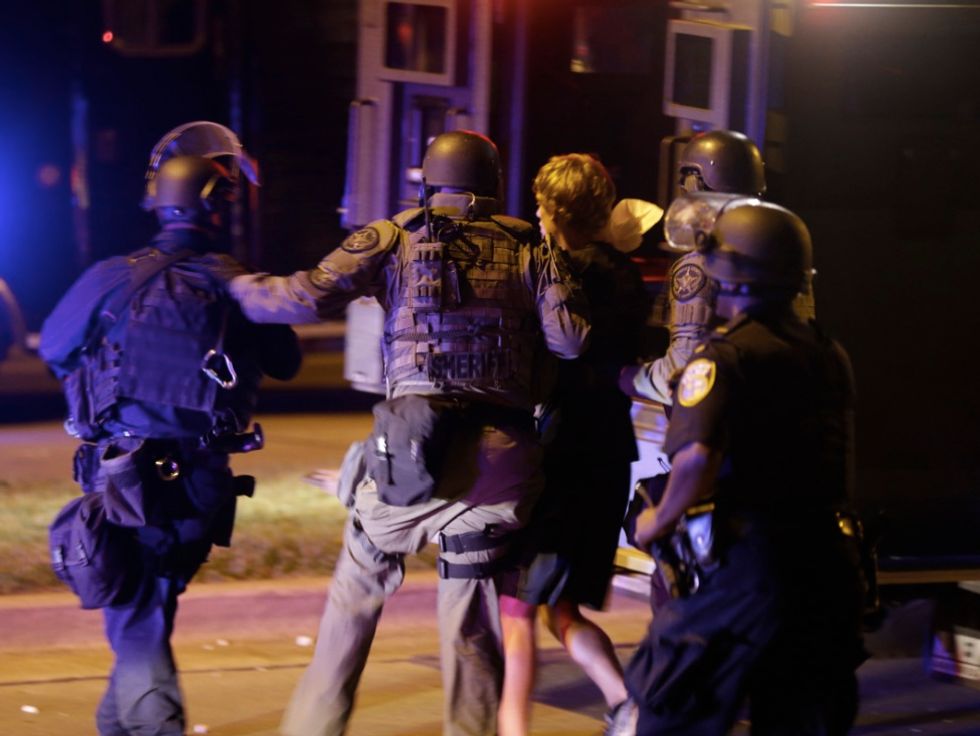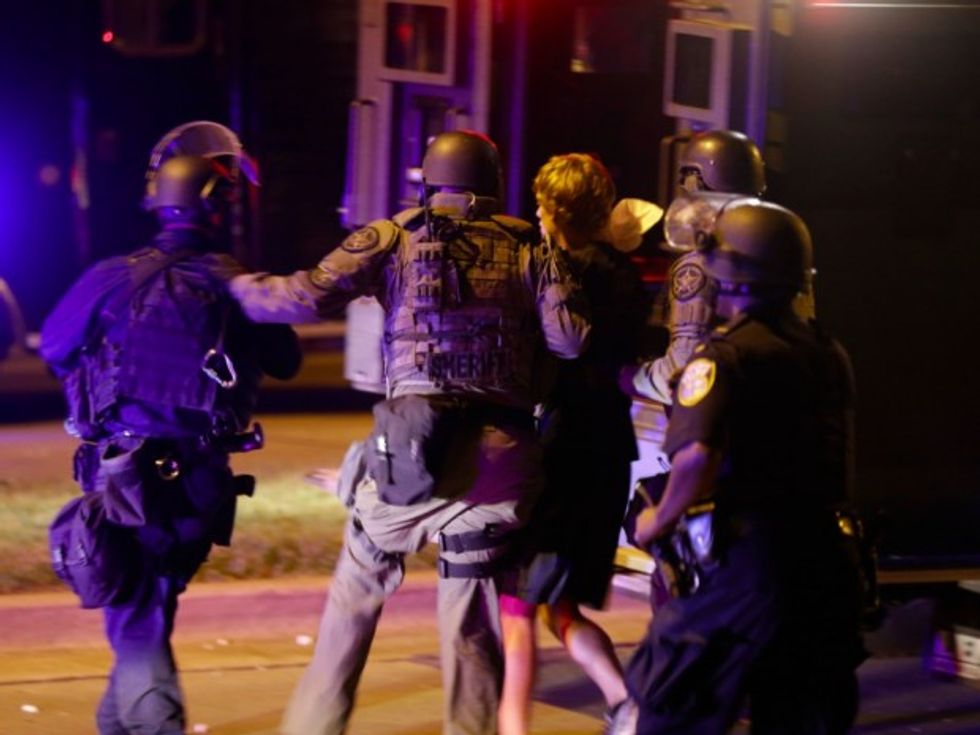This summer's series of police shooting blacks and blacks assassinating police seemed to have one silver lining: People on both sides seemed to agree on a need for dialog to promote understanding, mutual respect, and cooperation between two estranged segments of society.
Indeed, in the good news department, The Christian Science Monitor reported last week that in Boston, where communication between Boston's police and the city's racial minorities has been ongoing, violent crime has been decreasing, even as crime rates have spiked in cities like Baltimore and Chicago.
As is inevitable with such a massive challenge, there will be some occasional missteps along the way. Hopefully, we (all of us) will forgive those mistakes, learn from them, and remain committed to the overarching goal of peace and harmony overcoming distrust and violence.
 Police rush a man into a vehicle after getting pelted by rocks in Milwaukee, Sunday, Aug. 14, 2016. Police said one person was shot at a Milwaukee protest on Sunday and officers used an armored vehicle to retrieve the injured victim and take the person to a hospital, as tense skirmishes erupted for a second night following the police shooting of a black man. (AP Photo/Jeffrey Phelps)
Police rush a man into a vehicle after getting pelted by rocks in Milwaukee, Sunday, Aug. 14, 2016. Police said one person was shot at a Milwaukee protest on Sunday and officers used an armored vehicle to retrieve the injured victim and take the person to a hospital, as tense skirmishes erupted for a second night following the police shooting of a black man. (AP Photo/Jeffrey Phelps)
One potential misstep happened in Chicago a couple of weeks ago when the police department placed three officers on administrative leave for shooting to death a man who had sideswiped a police car and another vehicle. I can understand why the department took that step: They want the public to perceive that they are taking the problem of police killing minorities seriously. The problem in that particular case is that lethal force was used for the most justifiable of all reasons -- namely, to protect innocent life -- and for the cops to waiver in this mission due to public relations pressures runs the risk of magnifying the Ferguson effect (the tendency of police to ease off on enforcing laws against blacks out of fear of being branded "racist" with an ironic consequence being a surge in criminal behavior).
The cops were right in using guns to stop the dangerous driver. Who knows what kind of damage the driver might have done if he hadn't been stopped? A vehicle is a lethal weapon, as the July 14 incident in Nice, France so graphically illustrated. Had the police not acted to stop the driver, he might have killed innocent people, either on foot or in their own cars. Those victims might even have been black, and hopefully Chicago's police administrators got the message that black lives matter and black members of the community accept that innocent black lives take priority over criminally misbehaving blacks.
The primary function of a police force is to protect the lives of the people in the community they serve. Instead of clipping the wings of officers who, in this case, discharged that basic function by removing a deadly threat from the road, there are other police practices where reform should be considered. These include:
1) The rapacious practice of confiscating personal property through asset-forfeiture laws that bypass due process of law.
2) Police officers being assigned quotas for tickets and fines for the purpose of meeting municipal revenue targets, thereby perverting the police function by having officers become, in effect, tax collectors in communities where cowardly elected officials spend more money than they raise via taxation.
3) Police being called upon to enforce a multitude of picayune rules and economic regulations (here we should heed the wisdom of the Greek philosopher Isocrates: "Where there is a multitude of specific laws, it is a sign that the state is badly governed") -- a vivid example of this being the Eric Garner tragedy (the New York man who died after a chokehold was administered after he resisted arrest for selling illegal cigarettes). This is the bitter fruit of progressivism: Elected government controlling, regulating, and micromanaging economic activity to the point where it led to a man's unnecessary death.
4) Putting an end to the kind of chronic, unprovoked harassment of minorities that has so poisoned police-minority relations in Baltimore.
Speaking of Baltimore, the Department of Justice has determined that Baltimore police have shown deep-seated patterns of abuse and unconstitutional practices. The problematical aspect of DoJ's findings is that language about "severe and unjustified" racial disparities in rates of arrest and employing excessive force. Indeed, if Baltimore's cops have developed an Ahab-like fixation with black crime that has blinded them to common sense and decency, then a major rethinking is needed. However, if there is a racial disparity in the commission of crime, trying to engineer a regime in which people are arrested by race in proportion to their race's percentage of the city's population, they will run the risk of giving a green light to crime. Criminal misconduct cannot be policed in accordance with some sort of arrest quota system.
Just as the Chicago police over-reacted by disciplining those who shot the runaway motorist, so some black Americans have taken some counterproductive steps in the last couple of weeks. First, Black Lives Matter decided to make Korryn Gaines their cause celebre. That showed horrible judgment. Why honor or try to make a martyr out of a troubled young woman who resisted arrest by pointing a shotgun at members of a SWAT team, telling them she was going to kill them --a foolhardy move that cost her her life and easily could have cost the life of her innocent five-year-old son whom she was holding close during the confrontation.
Now, there has been violence in Milwaukee in response to a policeman (who happened to be black) shooting a young black man who was resisting arrest and refusing to drop the gun he was carrying. The "protests" occasionally have bubbled up into rioting, looting, and mayhem.
What can you say about those who have burned and looted the property of innocent citizens there? How does such common criminality balance the scales of justice? It doesn't, of course. However, there is good news: The punks who rioted were just a few hundred in number -- just a couple tenths of one percent of the black population of Milwaukee. Those looters and destroyers didn't represent the entire black community, but only the criminal element in the community. (With all the talk about greater use of video recording police in action, why don't the police and media capture as many faces of rioters and possible, identify them, then go to their homes and show Mom was junior has been up to. At least some of those kids would get quite a scolding, I'm sure.)
There is an obvious common denominator in the vast majority of cases in which cops have killed black men over the last couple of years: The deceased resisted arrest. This suggests an equally obvious solution: Everyone in the black community who sincerely wants to work out a health solution and reduce the tragic and unnecessary loss of black lives needs to accept and embrace one simple principle, namely, that their friends, loved ones, neighbors, et al. should peacefully submit to arrest. They should never resist it with threatening words, aggressive actions, or attempts to flee. Police -- not civilians -- have to be able to decide when someone is arrested. Cops simply can't afford to let the perp (whether actual or merely suspected) decide when he will allow himself to be arrested. It is 100 percent the cops' call, or you have anarchy instead of law.
I am not suggesting for a moment that every time a cop places someone under arrest that they are justified in doing so. Some of those arrests undoubtedly will be in error and perhaps even unjust -- things go wrong and people make mistakes and do bad things. But if black lives matter (and they do!) then blacks should do everything possible to save lives by discouraging members of their community from getting themselves killed by defying the cops' authority. It would be so much better for all involved -- it would mark real progress --if we could shift to having hearings about wrongful arrests rather than about possibly wrongful deaths.
If both police and black civilians compromise, communicate, and commit to finding ways to avert these tragic and eminently avoidable deaths, they can achieve this objective. Let's dial up the dialog and dial back the violence.
Mark Hendrickson is Fellow for Economic and Social Policy with the Center for Vision & Values at Grove City College.
–
TheBlaze contributor channel supports an open discourse on a range of views. The opinions expressed in this channel are solely those of each individual author.


 Police rush a man into a vehicle after getting pelted by rocks in Milwaukee, Sunday, Aug. 14, 2016. Police said one person was shot at a Milwaukee protest on Sunday and officers used an armored vehicle to retrieve the injured victim and take the person to a hospital, as tense skirmishes erupted for a second night following the police shooting of a black man. (AP Photo/Jeffrey Phelps)
Police rush a man into a vehicle after getting pelted by rocks in Milwaukee, Sunday, Aug. 14, 2016. Police said one person was shot at a Milwaukee protest on Sunday and officers used an armored vehicle to retrieve the injured victim and take the person to a hospital, as tense skirmishes erupted for a second night following the police shooting of a black man. (AP Photo/Jeffrey Phelps)


